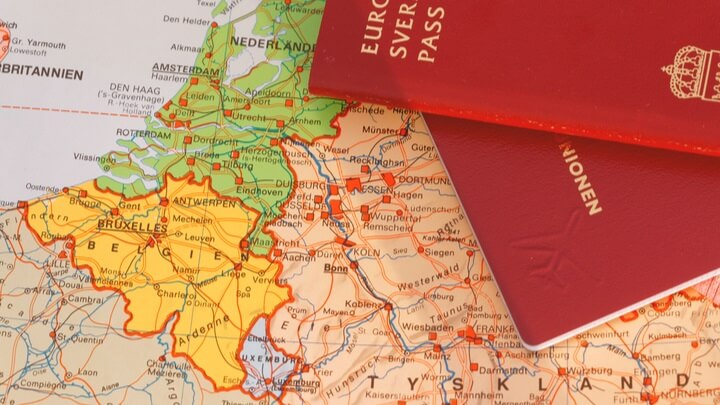Bank and public holidays in Belgium: 2017-2018 guide
Belgium is a melting pot of French, German and Flemish people, and that certainly affects the holidays that are celebrated in the country. Some holidays are...

Belgium is one of Europe’s foremost financial and political centres, drawing in expats from all over the world to work in Brussels and beyond. With large international communities, and a high standard of living, it's an attractive place to be, and many foreigners find themselves living and working in Belgium for the long term. If this sounds like you, then it might be time to consider applying for Belgian citizenship, which assures your place as a member of the Belgian community.
Whether you’re just starting the application process to get a work visa in Belgium or you’re an expat already living there, it’s good to know your options in regards to applying for Belgian citizenship. You might find that getting your very own Belgian and, thus, EU passport, is a good choice for you and your family.
Here’s a quick guide to why you might want to get Belgian citizenship - and how you can go about it.
Citizens of Belgium have different rights and responsibilities to migrants holding permanent residence. For example, one benefit of being a Belgian citizen is that you can come and go freely from Belgium without your citizenship being revoked. As a permanent resident, leaving the country for too long might mean that your status is changed and you have to re-submit a residency application.
As a citizen of Belgium you have the right to vote and be elected, and you can access government support and welfare if you need it. If you’re a Belgian citizen, you’re also a member of the EU, and have the right to live and work freely throughout the bloc.
You can apply for Belgian citizenship if your principal residence is in Belgium and you fulfil the requirements set by your municipality to qualify forcitizenship based on naturalisation or a declaration of nationality.
Regardless of the route you’re applying to, you have to fulfil certain basic requirements to be eligible. In most cases you’ll have to prove your integration into the local community and your ability to speak one of the official languages. The government will also refuse applications for anyone considered to be a security risk.
Application details for Belgian citizenship are documented on the Foreign Trade and Development Cooperation website, which is a great place to look for overarching process details. The regional municipalities then operate the citizenship process, so you’ll need to consult your local municipality website for the relevant forms you need. For example, the city of Brussels hosts details of the process and eligibility criteria to become a citizen on the ‘nationality’ pages of their website.
It’s possible to be a citizen of Belgium as well as another country, known as dual citizenship. The Belgian authorities won’t ask you to renounce your citizenship if you accept citizenship of another country. You do need to check the specifics if you want to take dual citizenship, though, as some countries won’t allow this, and you might be forced to choose between Belgian citizenship and your original nationality.
Depending on your personal circumstances there are several different ways you can claim Belgian citizenship. Aside from those outlined below, there’s also a citizenship route for people based on ‘exceptional merit’, or because they are currently stateless.
If you were born in Belgium to foreign parents who intend to stay legally in Belgium in the long term, you’ll probably also be eligible for citizenship. The rules have some caveats, so it’s worth seeking advice if you’re in this situation.
If you don’t qualify under any of the specific routes outlined below, you might be able to gain Belgian citizenship through declaration, if you’ve been legally resident in Belgium for 5 years with a good knowledge of one of the 3 national languages and can prove your social and economic integration.
There’s no direct route to get Belgian citizenship through investment. Even if you’re there as an investor or entrepreneur, you’ll need to fulfil the residence requirements, which means it will take up to five years of living in Belgium before your application can be considered.
The rules surrounding Belgian citizenship by descent are applied based on your date of birth, and assume you were born outside of Belgium. If you were born after 1985, the following rules apply. If you were born prior to this, it’s worth checking out the small print because there are some variants on the rules for citizenship by descent depending on where and when you and your parents were born.
If you were born after 1 January 1985, you can become a Belgian citizen through descent if at least one of your parents was a Belgian citizen, born themselves in Belgium. This applies regardless of where you were born.
Otherwise, you can become a Belgian citizen if your parent is a Belgian citizen but wasn’t born in Belgium themselves, as long as the Belgian parent made a declaration before you were five years old, requesting that you were made a Belgian citizen.
If the same situation applies, but your parent didn’t get the declaration made before you were five, you can only take up Belgian nationality if you’re not granted the nationality of another country before the age of 18. If you accept citizenship of a different country in this timeframe, you lose your right to become a Belgian citizen.
Even if you have a Belgian spouse or partner, you’ll need to have been legally resident in Belgium for 5 years with a good knowledge of one of the 3 national languages to beeligible for Belgian citizenship. You must also prove your social and economic integration, although your relationship is likely to count in your favour in this regard.
The basic route for applying for citizenship is the same, whatever the grounds for your application, and is managed by your local municipal authorities. You’ll need to complete the online forms, and submit them along with a suite of documents which support your application and show how you fulfil the criteria set out.
It’s worth checking exactly what you need with the relevant authorities, before you collect the documents needed for your application. In most cases, you’ll have to have documents translated if they’re not in one of the official languages of Belgium, and copies of documents must be certified.
If for some reason you have to apply from abroad, you’ll have to talk to your local embassy to understand their processes for managing citizenship applications.
Fees are payable for all routes to citizenship, although there are concessions available under some circumstances. The exact cost depends on your situation and the local municipality rules. You can only pay in the local currency, which is euros in Belgium. In Brussels, for example, it will cost you 150€ to register your application as an adult.
If you need to make an international money transfer to cover your costs, your bank might charge you more than you realise, using a poor exchange rate and adding in administration fees. A better option, if you have a Belgian bank account, or know someone who does, is to useWise, and have your transfer processed using the real exchange rate with only a small transparent fee.
The processing time for your citizenship application depends on your personal circumstances, and where exactly your submit your application, as each municipality runs their own process. In Brussels, for example, it will take 5 to 8 months to process an application, assuming it’s correctly submitted.
Once your citizenship is arranged, you canapply for a Belgian passport. You’ll need to do this with your local municipality if you live in Belgium. If you're outside of the country you can also make your application at your local embassy.
As getting a passport is a separate process from getting your citizenship, there arefurther fees to pay. It'll cost around 65€ for a standard adult passport, and much more if you need it in a hurry.
Becoming a Belgian citizen might mean you have to jump a few administrative hoops - but it'll be worth it in the end.
Good luck on becoming a Belgian citizen!
*Please see terms of use and product availability for your region or visit Wise fees and pricing for the most up to date pricing and fee information.
This publication is provided for general information purposes and does not constitute legal, tax or other professional advice from Wise Payments Limited or its subsidiaries and its affiliates, and it is not intended as a substitute for obtaining advice from a financial advisor or any other professional.
We make no representations, warranties or guarantees, whether expressed or implied, that the content in the publication is accurate, complete or up to date.

Belgium is a melting pot of French, German and Flemish people, and that certainly affects the holidays that are celebrated in the country. Some holidays are...

Brussels is usually seen as the perfect location for expats wanting to explore Europe in their spare time. Sometimes called the “capital of Europe”, Belgium...

Brussels is the de facto capital of Europe, and with many European institutions and global businesses based there, it’s become a hub of expat activity. A...